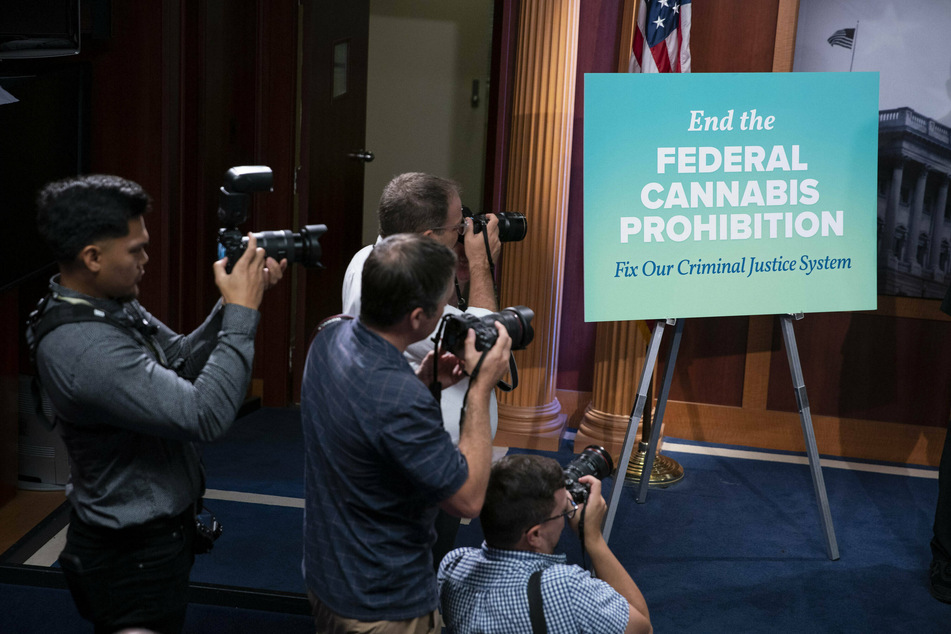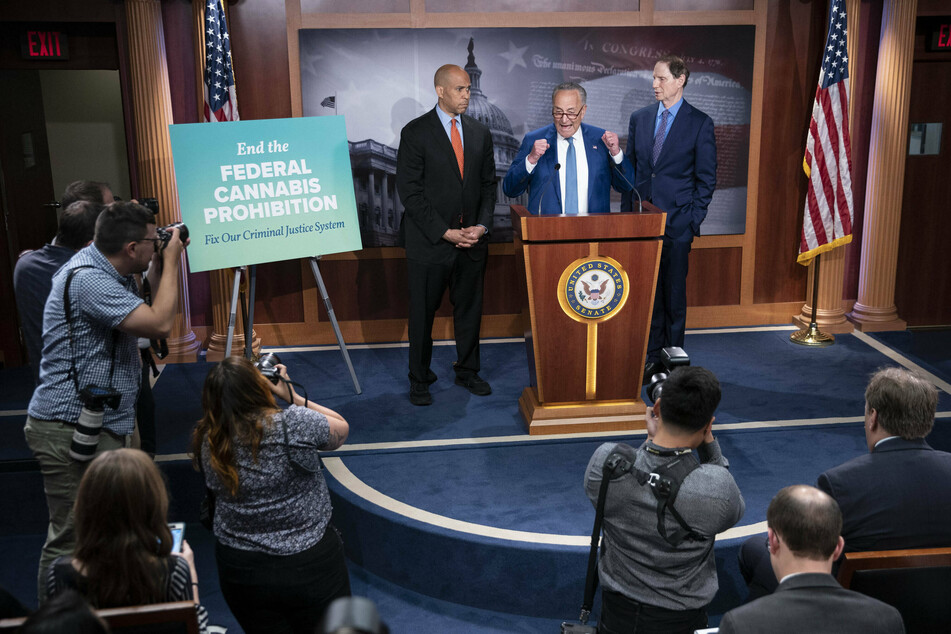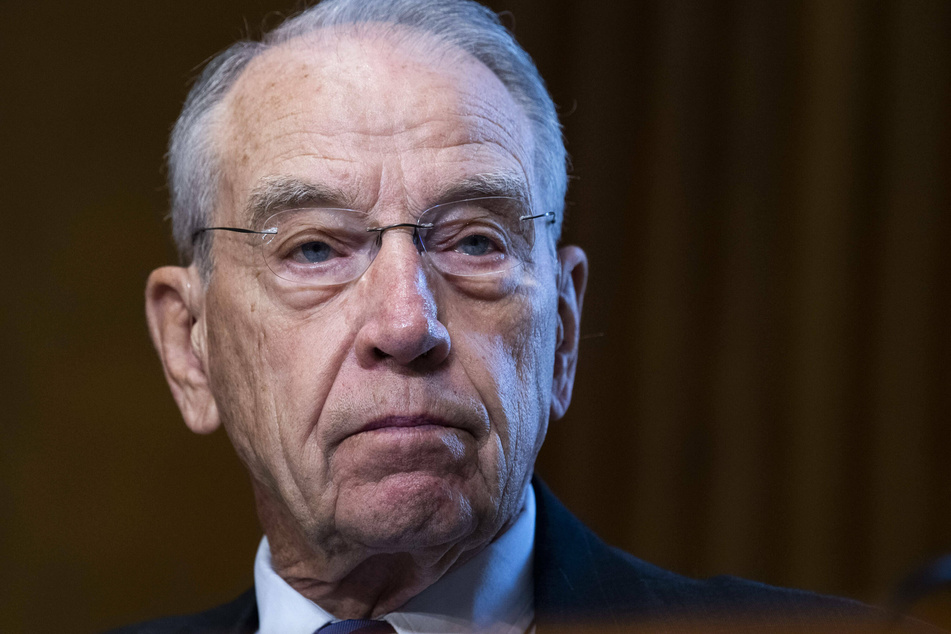Senate Democratic leaders light up efforts to legalize weed with milestone draft bill
By Lauren Clason, CQ-Roll Call
Washington DC - Senate Majority Leader Chuck Schumer unveiled draft legislation Wednesday that would decriminalize cannabis and expunge federal sentences tied to the drug, which has been legalized in states across the country.

The bill would erase the records of nonviolent marijuana offenders and allow those currently serving time to petition a court for resentencing. Federal tax revenues would support a trust fund to reinvest in communities most impacted by enforcement involving the drug.
Advocates were split over aspects of the bill, which is cosponsored by Democratic Senators Cory Booker of New Jersey and Ron Wyden of Oregon.
Polling indicates the vast majority of Americans support the legalization of marijuana in some form, and the issue has especially gained steam among advocates for treating veterans’ mental health issues.
"As my colleagues and I have said before, the war on drugs has really been a war on people, particularly people of color," Schumer (70) said.
Booker (52) highlighted the hypocrisy of congressional and presidential candidates readily admitting their history of marijuana use, while low-income people and people of color bear "the stain" of criminal convictions.
"This is a grievous reality," he said. "Lives are being destroyed every single day."
An end in sight for decades of contradictory rules

Schumer said the next step would be to gather feedback from interest groups, many of which were quick to weigh in on Wednesday.
"It is time for legislators to comport federal law with the laws of the growing number of states that have legalized the plant, and it is time for lawmakers to facilitate a federal structure that allows for cannabis commerce so that responsible consumers can obtain high-quality, low-cost cannabis grown right here in America without fear of arrest and incarceration," advocacy group NORML Executive Director Erik Altieri said in a statement.
Drug Policy Alliance National Affairs Director Maritza Perez urged lawmakers to drop provisions maintaining drug tests for federal employees and excluding those who received "kingpin" convictions from expunging their records.
"In order for this bill to truly end marijuana prohibition in a comprehensive way and begin to repair the egregious harms of the past, we cannot continue to make room for some to be left out because of laws that were unjust and racist to begin with," she said in a statement.
But another group, Smart Approaches to Marijuana, urged a more deliberate approach.
"Decriminalization of minor marijuana possession and expungement of previous records was a key part of President Joe Biden’s platform and should be the path forward, but we cannot let the interests of the for-profit marijuana industry and its investors cloud the discussion," Kevin Sabet, the organization’s president and a former Obama administration senior drug policy adviser, said.
"Much as we have done with Covid, we must heed the science and be cautious with normalizing and promoting marijuana use."
The bill would end years of contradictory federal rules in states that legalized cannabis and would implement regulations on a booming marijuana market for the first time.
To date, recreational marijuana use is legal for adult use in 18 states, Washington, DC, Guam and the Northern Mariana Islands. Medicinal use is legal in 37 states, Washington DC, Puerto Rico, Guam, and the US Virgin Islands.
Questions over White House support

Under the draft bill, people would no longer be at risk of deportation because of cannabis use. Health care providers with the Department of Veterans Affairs and the Indian Health Service could prescribe medical marijuana.
The bill would not override laws in states where marijuana remains illegal, and it would maintain bans on transporting large amounts of marijuana into those states.
The legislation would levy a 10% excise tax on cannabis products in the first full year of enactment, which would gradually rise to 25% thereafter. Revenues would attempt to make amends for the war on drugs by investing in legal aid, reentry services and business loans.
The comptroller general would be tasked with studying further areas in need of change, including whether to replace the word marijuana with cannabis in the federal code in an attempt to reduce stigma.
Some products would still be outlawed, including items that combine cannabis with alcohol, caffeine or nicotine. Electronic delivery, or vaping, devices would be prohibited from offering flavors, in an apparent attempt to avoid a repeat of the teen vaping epidemic partially fueled by e-cigarette marketing.
The draft leaves some open questions about how marijuana should be regulated, including how potency levels would be measured and whether new marijuana products should undergo premarket review by the Food and Drug Administration (FDA) before they hit store shelves.
Despite the high-powered support among top lawmakers, the legislation faces significant hurdles. Biden’s decades-long opposition to legalization presents one obstacle to enacting Schumer’s bill. Though Biden supported decriminalizing marijuana possession on the campaign trail, news broke in March that the White House sidelined young staffers for prior marijuana use.
"The White House knows we are introducing this legislation, and we intend to show them the draft legislation and ask them to support it," Schumer said Wednesday.
Republicans urge slower pace

In April, Schumer told Politico that he would not wait for the president’s backing to advance the bill in the Senate.
Republican Senator Chuck Grassley (87) of Iowa said Democrats’ effort amounted to putting "the cart before the horse" and said his previous research bill with Democratic Senator Dianne Feinstein of California should be used as the first step toward full legalization.
"It’s important that we have robust research and fully understand the good and the bad of marijuana use, especially in young people and over the long term," he said in a statement.
Late last year, the House passed a bill that would remove marijuana from the federal schedule of controlled substances and redress the war on drugs through similar criminal justice changes, social services investments and business loans. The bill was reintroduced by Judiciary Committee Chairman Representative Jerrold Nadler, a Democrat from New York, in May.
House lawmakers are also seeking to facilitate research for Schedule I drugs in the Department of Health and Human Services appropriations bill. The House Appropriations Committee is expected to approve the bill Thursday after a subcommittee advanced it Monday.
Cover photo: IMAGO / UPI Photo

